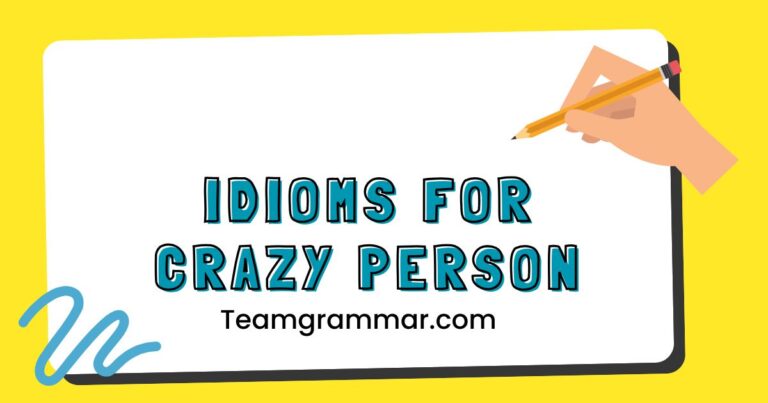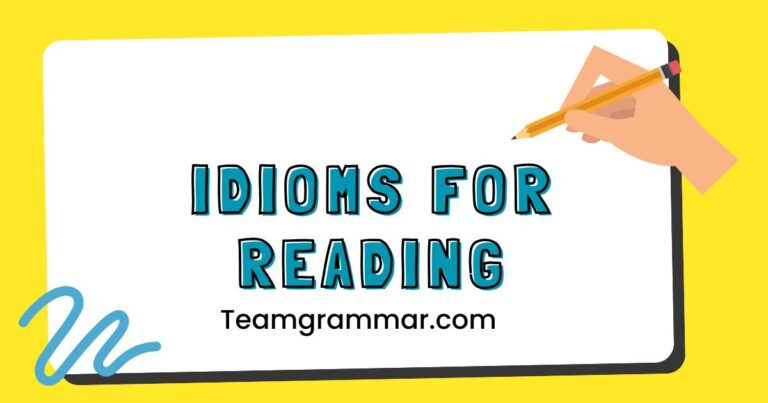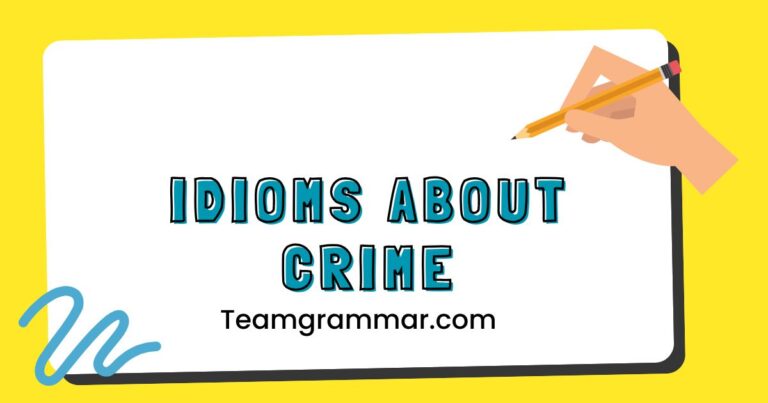33 Idioms for Short: Mastering Concise Expressions in English
Idioms are an integral part of the English language, adding color, depth, and nuance to everyday conversations. Understanding idioms, especially those relating to brevity or shortness, enhances your ability to communicate effectively and comprehend native speakers.
This article delves into the world of idioms associated with “short,” exploring their meanings, origins, and practical usage. Whether you’re an ESL student, a language enthusiast, or simply looking to enrich your vocabulary, this guide provides a comprehensive overview to help you master these concise expressions and use them confidently in various contexts.
Table of Contents
- Introduction
- Definition of Idioms for Short
- Structural Breakdown
- Types and Categories
- Examples of Idioms for Short
- Usage Rules
- Common Mistakes
- Practice Exercises
- Advanced Topics
- FAQ
- Conclusion
Definition of Idioms for Short
An idiom is a phrase or expression whose meaning cannot be understood from the literal meanings of its individual words. Instead, it has a figurative meaning that is known through common use.
Idioms related to “short” typically convey ideas of brevity, lack of duration, limited distance, or a concise manner. These idioms function to add color and emphasis to speech, making it more engaging and expressive.
Idioms are classified as a type of figurative language, often contrasting with literal language. Their function in communication is to provide a more vivid or nuanced way of expressing an idea than could be achieved through straightforward language.
The context in which an idiom is used is crucial for understanding its intended meaning, as the same set of words can have different meanings in different situations.
Understanding idioms is essential for mastering English because they are frequently used in everyday conversation, literature, and media. Without a grasp of idiomatic expressions, learners may misinterpret the speaker’s intent or struggle to express themselves naturally.
Idioms relating to “short” are particularly common and versatile, covering a wide range of concepts and scenarios.
Structural Breakdown
The structure of idioms related to “short” can vary widely, but they generally consist of a combination of words that, when taken literally, do not convey the intended meaning. These idioms often involve prepositions, verbs, nouns, and adjectives, working together to create a unique figurative expression.
The key to understanding these idioms lies in recognizing the established pattern and associating it with its accepted meaning.
For example, the idiom “short and sweet” follows a simple adjective-conjunction-adjective pattern, conveying the idea of something being brief and pleasant. Similarly, “cut short” involves a verb followed by an adjective, indicating that something has been abruptly ended.
The structural elements of these idioms are fixed, meaning that altering the order or substituting words can change the meaning or render the expression nonsensical.
The grammatical function of idioms can also vary depending on the specific expression. Some idioms act as adjectives, describing a noun (e.g., “a short fuse”), while others function as verbs, indicating an action (e.g., “fall short”).
Recognizing the grammatical role of an idiom within a sentence is crucial for using it correctly and understanding its meaning in context.
Types and Categories
Idioms for “short” can be categorized based on the concepts they represent. This categorization helps in understanding their diverse applications and nuances.
Here are some common categories:
Time-Related Idioms
These idioms refer to the duration or length of time. They often describe something that is brief, fleeting, or has a limited lifespan.
Examples include “in short order,” “short-lived,” and “a short while.”
Distance-Related Idioms
These idioms describe physical distance or proximity. They often indicate that something is nearby, within reach, or covers a small area.
Examples include “short hop,” “short distance,” and “within a stone’s throw.”
Personality-Related Idioms
These idioms describe personality traits or characteristics, particularly those related to patience, temper, or emotional reactions. Examples include “short fuse,” “short-tempered,” and “short with someone.”
Descriptive Idioms
These idioms describe qualities or attributes in a concise or abbreviated manner. They often convey the idea of something being brief, succinct, or lacking in detail.
Examples include “short and sweet,” “in a nutshell,” and “to make a long story short.”
Examples of Idioms for Short
To fully grasp the meaning and usage of idioms for “short,” let’s explore a variety of examples categorized by their primary concept. Each example will be presented in a sentence to illustrate its context and application.
Time-Related Examples
The following table provides examples of time-related idioms using the term “short.” Each idiom is shown in a sentence to illustrate its usage.
| Idiom | Meaning | Example Sentence |
|---|---|---|
| In short order | Very quickly or soon | The problem was resolved in short order. |
| Short-lived | Lasting only for a brief time | Their happiness was short-lived. |
| A short while | A brief period of time | I’ll be back in a short while. |
| Cut short | To end something abruptly | The meeting was cut short due to a fire alarm. |
| Short notice | Little advance warning | I had to cancel the trip on short notice. |
| Short term | Lasting for a limited period | We are only focusing on short term goals. |
| Fall short | Fail to reach a required standard | The team fell short of their target this quarter. |
| Short shrift | Little or no attention or consideration | The proposal was given short shrift by the committee. |
| Make short work of | Deal with quickly and efficiently | He made short work of the pile of paperwork. |
| In the short run | In the immediate future | In the short run, this decision will save us money. |
| Short and sweet | Brief and pleasant | The presentation was short and sweet, just what we needed. |
| Short measure | Less than the correct amount | I think the bartender gave me short measure. |
| Short commons | A limited supply of food or resources | During the recession, many families were on short commons. |
| Short meter | A type of hymn with short lines | The choir sang the hymn in short meter. |
| Short whist | A variation of whist played with fewer cards | They played a game of short whist after dinner. |
| Short-dated | Having a short expiration date | Buy the milk with the latest, not the short-dated one. |
| Short fuse | Quick to anger | He has a short fuse, so be careful what you say. |
| Short of breath | Having difficulty breathing | After running up the stairs, I was short of breath. |
| Short change | To give less than what is due | The cashier tried to short change me. |
| Short circuit | A malfunction in an electrical circuit | The lights went out because of a short circuit. |
| Short stop | A defensive position in baseball | The short stop made an incredible play. |
| Short sale | Selling a property for less than the mortgage owed | They had to do a short sale on their house. |
| Short story | A brief work of fiction | She wrote a short story for the competition. |
| Short temper | A tendency to get angry easily | He has a short temper, so avoid arguing with him. |
| Short wave | A radio frequency band | They communicated using short wave radio. |
Distance-Related Examples
The table below presents idioms related to physical distance, using “short” to convey proximity or limited range.
| Idiom | Meaning | Example Sentence |
|---|---|---|
| Short hop | A short trip or distance | It’s just a short hop to the grocery store. |
| Short distance | A small length | The park is within a short distance from my house. |
| Within a stone’s throw | Very close by | The beach is within a stone’s throw of the hotel. |
| Short haul | A journey over a relatively short distance | We prefer short haul flights to avoid jet lag. |
| Short route | A quicker or more direct path | Taking the short route saved us a lot of time. |
| Short leash | Close control or supervision | The new manager keeps everyone on a short leash. |
| Short field | A small or limited area | The plane landed on a short field. |
| Short cast | A brief throw or distance covered in casting | The fisherman made a short cast towards the riverbank. |
| Short leg | A fielding position in cricket | The fielder at short leg took a brilliant catch. |
| Short putt | A short distance putt in golf | He missed a short putt that cost him the game. |
| Short pass | A brief throw or distance covered in casting | The quarterback threw a short pass to the receiver. |
| Short walk | A brief walk or distance covered by foot | It’s a short walk to the coffee shop. |
| Short drive | A brief drive or distance covered by car | It’s a short drive to the beach from here. |
| Short reach | A brief reach or distance covered by hand | The item was just out of my short reach. |
| Short tether | A brief tether or distance covered by rope | The goat was kept on a short tether. |
Personality-Related Examples
This table illustrates idioms that use “short” to describe personality traits, particularly those related to temper and patience.
| Idiom | Meaning | Example Sentence |
|---|---|---|
| Short fuse | Easily angered or irritated | He has a short fuse, so try not to provoke him. |
| Short-tempered | Having a tendency to get angry quickly | She’s short-tempered, but she doesn’t mean any harm. |
| Short with someone | Speaking to someone in a rude or abrupt manner | I didn’t mean to be short with you; I’m just stressed. |
| Come up short | Fail to meet expectations | He came up short in the final round of the competition. |
| Short shrift | To give inadequate attention to someone or something | The new proposal received short shrift at the meeting. |
| Short on patience | Lacking patience | I am short on patience today, so please be quick. |
| Short circuit | A malfunction in an electrical circuit | His brain seemed to short circuit when faced with the difficult problem. |
| Short of cash | Lacking money | I’m a little short of cash this week, can I pay you back next week? |
Descriptive Idioms Examples
The following table provides examples of descriptive idioms using the term “short.”
| Idiom | Meaning | Example Sentence |
|---|---|---|
| Short and sweet | Brief and pleasant | The speech was short and sweet, perfect for the occasion. |
| In a nutshell | In brief or in summary | In a nutshell, the project was a success. |
| To make a long story short | To summarize a lengthy explanation | To make a long story short, we decided to move to a new city. |
| Short list | A limited list of candidates or items | Only five candidates made it to the short list. |
| Short answer | A brief response | The short answer is no. |
| Short version | A condensed or abbreviated account | Can you give me the short version of the story? |
| Short order | A food order that is prepared quickly | He ordered a short order of pancakes at the diner. |
| Short sale | The sale of a property for less than the outstanding mortgage | They had to do a short sale on their house due to financial difficulties. |
| Short shift | To treat someone unfairly or without proper consideration | The workers felt they were getting short shift from the management. |
| Shortcoming | A fault or weakness | Despite his shortcomings, he is a valuable member of the team. |
Usage Rules
Using idioms correctly requires understanding the specific context in which they are appropriate. Here are some key rules to consider:
- Context is Key: Always consider the situation and audience when using idioms. Some idioms are informal and may not be suitable for formal settings.
- Word Order: Idioms have a fixed word order. Changing the order can alter the meaning or make the expression nonsensical.
- Tense and Agreement: Adjust the tense and verb agreement as needed to fit the sentence structure. For example, “He cut the meeting short” can become “He is cutting the meeting short.”
- Avoid Overuse: While idioms can add color to your language, overuse can make your speech sound unnatural or forced.
- Know Your Audience: Be mindful of your audience’s familiarity with English idioms. If you’re speaking to non-native speakers, consider using simpler language.
It’s also important to note that idioms can sometimes have regional variations. An idiom that is common in one English-speaking country may be less familiar in another.
Therefore, exposure to different dialects and cultural contexts is beneficial for mastering idiomatic expressions.
Common Mistakes
Learners often make mistakes when using idioms, especially when they try to interpret them literally. Here are some common errors and how to avoid them:
| Incorrect | Correct | Explanation |
|---|---|---|
| “I will return in a short time.” | “I will return in short order.” | “In short order” is the correct idiom for meaning “very soon.” |
| “He has a small fuse.” | “He has a short fuse.” | The correct idiom is “short fuse,” meaning easily angered. |
| “The movie was cutted short.” | “The movie was cut short.” | The past participle of “cut” is “cut,” not “cutted.” |
| “The distance is at a stone’s throw.” | “The distance is within a stone’s throw.” | The correct preposition is “within.” |
| “To do short of the story.” | “To make a long story short.” | The correct idiom is “to make a long story short,” meaning to summarize. |
Another common mistake is using idioms out of context. For example, using “short and sweet” to describe a negative experience would be inappropriate, as the idiom implies something pleasant.
Practice Exercises
Test your understanding of idioms for “short” with these practice exercises. Choose the correct idiom to complete each sentence.
| Question | Options | Answer |
|---|---|---|
| 1. The meeting was _______ due to unforeseen circumstances. | a) cut short b) short cut c) short time | a) cut short |
| 2. He has a _______, so be careful what you say. | a) small fuse b) long fuse c) short fuse | c) short fuse |
| 3. I need to finish this project _______. | a) in a short order b) in short order c) on short order | b) in short order |
| 4. The beach is _______ from our hotel. | a) within a stone’s throw b) at a stone’s throw c) near a stone’s throw | a) within a stone’s throw |
| 5. _______, we decided to accept the offer. | a) To make a short story long b) To make a long story short c) To make a story short | b) To make a long story short |
| 6. The company’s profits _______ of expectations this year. | a) fell long b) fell short c) fell tall | b) fell short |
| 7. I am _______ this month, can I borrow some money? | a) short of breath b) short of cash c) short of time | b) short of cash |
| 8. The presentation was _______ and to the point. | a) long and sweet b) short and bitter c) short and sweet | c) short and sweet |
| 9. The job was completed with _______. | a) short shrift b) quick shrift c) make short work | c) make short work |
| 10. The manager kept the employees on a _______. | a) long leash b) short leash c) no leash | b) short leash |
More Practice: Fill in the blanks with the correct idiom.
| Question | Options | Answer |
|---|---|---|
| 1. I can’t believe they gave my proposal such _______. | a) short shrift b) long shrift c) full shrift | a) short shrift |
| 2. She’s been _______ with me lately, I wonder what’s wrong. | a) short for b) short to c) short with | c) short with |
| 3. Our summer vacation was far too _______. | a) short-lived b) long-lived c) never-lived | a) short-lived |
| 4. This is the _______ to get to the city center. | a) shortest route b) short route c) longer route | b) short route |
| 5. He gave _______ answer to my question. | a) long b) short c) medium | b) short |
| 6. The project is only _______, so we’ll need to extend the deadline. | a) short term b) long term c) medium term | a) short term |
| 7. He is _______ and has no patience for nonsense. | a) short-tempered b) long-tempered c) medium-tempered | a) short-tempered |
| 8. The new building is _______ from the train station. | a) within a stone’s throw b) far away c) several miles | a) within a stone’s throw |
| 9. I had to cancel my trip on _______. | a) short notice b) long notice c) a lot of notice | a) short notice |
| 10. The presentation was _______, so it kept everyone’s attention. | a) short and sweet b) long and bitter c) drawn out | a) short and sweet |
Advanced Topics
For advanced learners, exploring the etymology and historical context of idioms can provide a deeper understanding of their meaning and usage. Many idioms have roots in historical events, literature, or cultural practices.
Researching the origins of idioms can reveal fascinating insights into the evolution of the English language.
Additionally, advanced learners can focus on mastering the subtle nuances of idiomatic expressions and using them creatively in their writing and speech. This involves paying close attention to the connotations and implications of idioms, as well as experimenting with different ways to incorporate them into various contexts.
Another area for advanced study is the comparison of idioms across different languages. While some idioms may have direct equivalents in other languages, others may be unique to English.
Understanding these differences can improve cross-cultural communication and prevent misunderstandings.
FAQ
Here are some frequently asked questions about idioms for “short”:
- What is the difference between an idiom and a proverb?
An idiom is a phrase whose meaning is not predictable from the usual meanings of its constituent elements, while a proverb is a short, well-known saying that expresses a general truth or piece of advice. Idioms are figurative expressions, while proverbs are statements of wisdom or common sense.
- How can I improve my understanding of English idioms?
Read extensively, listen to native speakers, and pay attention to the context in which idioms are used. Keep a notebook of new idioms you encounter and practice using them in your own speech and writing.
- Are idioms the same in all English-speaking countries?
No, idioms can vary significantly between different English-speaking countries. Some idioms are specific to certain regions or cultures.
- Is it okay to use idioms in formal writing?
It depends on the specific idiom and the tone of your writing. Some idioms are informal and not appropriate for formal contexts, while others are more widely accepted.
- How can I avoid misusing idioms?
Always double-check the meaning and usage of an idiom before using it. Pay attention to the context and audience, and avoid using idioms if you are unsure of their meaning or appropriateness.
- Why are idioms so difficult to learn?
Idioms are difficult because their meanings are not literal and must be learned through exposure and practice. They also often have cultural or historical origins that are not immediately obvious.
- Can I create my own idioms?
While it’s possible to create new expressions, they won’t be considered idioms unless they gain widespread use and acceptance. Idioms are established through common usage over time.
- How do I know when to use an idiom?
Use idioms when they add color, emphasis, or nuance to your language, and when you are confident that your audience will understand their meaning. Avoid using idioms if they are unnecessary or confusing.
- Are there any online resources for learning English idioms?
Yes, there are many online dictionaries, websites, and apps that provide definitions, examples, and quizzes for learning English idioms. Some popular resources include the Oxford Idioms Dictionary, Merriam-Webster’s Learner’s Dictionary, and various ESL websites.
- How important is it to learn idioms for mastering English?
Learning idioms is crucial for mastering English, as they are frequently used in everyday conversation, literature, and media. Without a grasp of idiomatic expressions, learners may struggle to understand native speakers and express themselves naturally.
Conclusion
Mastering idioms for “short” is a valuable step towards fluency in English. These concise expressions add depth and color to your language, allowing you to communicate more effectively and understand native speakers more easily.
By understanding the definitions, structures, and usage rules of these idioms, you can confidently incorporate them into your everyday conversations and writing.
Remember to pay attention to context, avoid overuse, and be mindful of your audience. Practice using idioms regularly, and don’t be afraid to make mistakes – learning from your errors is a key part of the process.
With dedication and practice, you can master these concise expressions and enrich your command of the English language.







